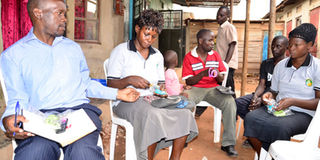Waging war on unemployment

Members of Springs of Goodwill at one of their meetings. Photo by Dominic Bukenya.
Kampala, Uganda
“All these things were individual pieces at one time. It is the group members who have worked on them to produce the beautiful work you see,” says James Tenywa, pointing at a pile of flip flops and colourful bead jewellery. The group members present about five women and three men are undeniably proud of their work.
A few years ago, none of them could imagine they would be part of something like this, but they are, and Springs of Goodwill is the name of their community-based organisation.
Kiggundu Zone, where the group is based, is part of the Kavule Ward and is not too far away from the country’s largest and most prestigious educational institution, Makerere University. Still, this little community, according to residents, has had high school dropout rates in both primary and secondary.
Most of the residents rent one-room units and the dirt track that is the access road is sometimes used as the drainage. If you ask the people here, they say, “We are poor.”
Tenywa, the 46-year-old man who founded the group, has lived here for over a decade and is among the more fortunate ones, managing to rent a bigger house for his family. He has a diploma in journalism, and his current job is at a vernacular radio station, Radio Simba, as a newscaster. The father of six is also an assistant pastor at an evangelical church.
However, with the members of Springs of Goodwill, he is but one of them and strives to ensure everyone feels included. He requests us to speak in the local language, Luganda, since it is what most members are comfortable with and passes on questions so anyone can talk about the group’s activities.
Tenywa always had the heart to do something for the community. But it became necessary to start something in 2012. “2011 was an election year and people here were high on the promises of candidates who had come for campaigns. They had been told to write their project proposals and they would be funded. Everyone was so excited, running around forming groups and preparing. But after the elections, nothing happened,” he narrates.
Tenywa then thought of doing something that would improve the livelihoods of the disillusioned community. The response to his group idea was initially overwhelming. Residents thought the money they had waited so long for had come, then when they learnt there was no such thing, many left.
But some stayed and today, Springs of Goodwill has about 48 active members. They meet twice a month and pay an attendance fee of Shs1,000 per head for each meeting. They also pay a one-time membership fee of Shs5,000 each. From these funds, they are able to help any member caught in a bind, say for instance a big hospital bill, or funeral costs after a death in the family.
The money also goes towards group projects. Currently it is a small events company, Goodwill Events Company with 200 chairs for hire and a 300-seater tent. They have been getting jobs around the community and are hoping to expand soon.
Members have also benefitted from skills training, as evidenced by Theo Kirabo, a flip flop maker’s work. Tenywa says the skills training achieves more than putting money in the group member’s pockets. “When they learn, they go practice the skills at home and in turn train some members or their children, so we are really arming more than one person with important skills,” he says.
Each member is also part of a “cash round”, a savings scheme that gives members according to amounts they are able to save weekly and that sees members give one week’s collections to each member in turns. “The logic is that while it is difficult to save and raise capital for starting out the ventures we train for, each member can afford to save a small amount at a time and after a few weeks achieve their goal,” he says.
They are not working with much, but every little they have is going a long way.
The group members also participate in cleaning drives, within the neighborhood and in surrounding areas. The gray T-shirt emblazoned with the group’s logo, which members wear is now respected around the community.
Tenywa’s greatest joy is that the members of the community he loves so much have an alternative now. “We may still have problems, but we have solutions too now. That ability is important. If one of our members has a problem, now they have somewhere to go. It gives us some dignity and hope.”
Making and selling sandals
Theo Kirabo, a mother of six, has always sold shoes for a living in mobile markets around the capital city. This year she incorporated her first made-in-Uganda products, the flip flops she learnt how to make using old belts, discarded car tyres and rubber.




